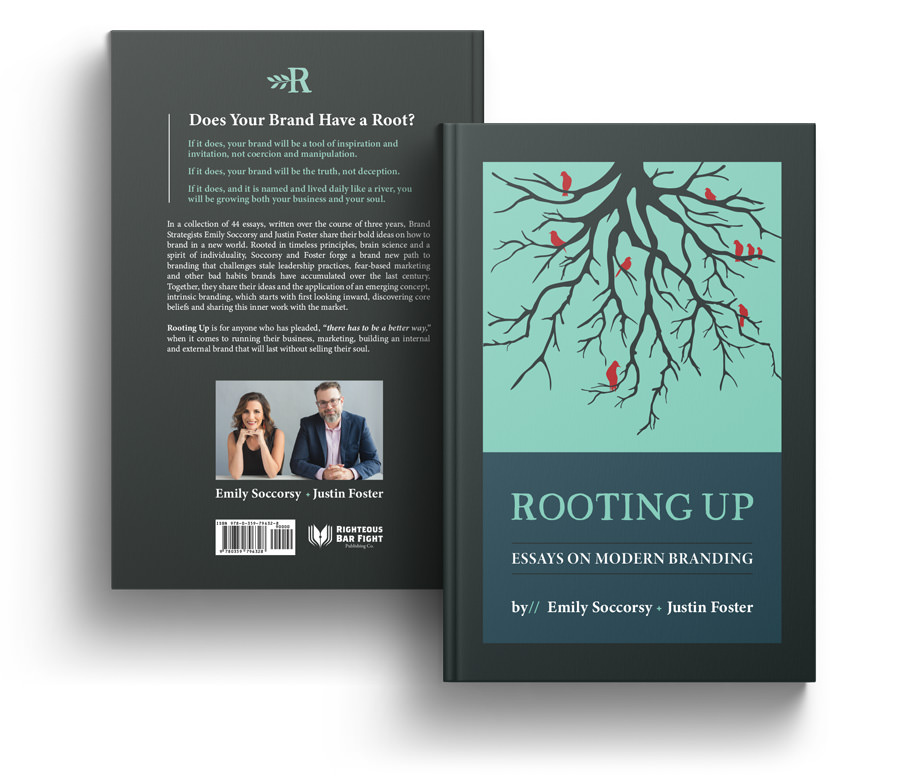Filed Under: Intrinsic Branding, Leadership
By Emily Soccorsy
Discipline terrifies many. Encoded to equate to punishment or forced obedience, the word itself often causes tension, elicits immediate resistance, and generates fear.
I understand and can empathize with those responses.
I give the idea of “discipline” a warmer reception.
Root: Go Inward
To be transparent, I kind of love discipline. I see it as a best friend. For me, it’s an always-reliable strategy to: tackle a challenge, thrust myself out of sticky doldrums, advance my career.
Discipline is my failsafe approach to accelerating.
Whenever I have been:
- Intimidated as hell
- Unclear on how to start
- Insecure about a challenge I faced
I have turned to discipline to hep me get going, and keep at it.
Discipline is the reason I am here today.
Discipline is a reliable, consistent supporter.
I now know I am an intellectual. I love to learn, am endlessly curious, and enjoy studying, reading, and synthesizing what I learn. It wasn’t always so. As a kid who was always comparing herself to her siblings and other students who earned better grades, I didn’t feel I was the smart one. Nor was I the athletic one. Nor was I the creatively talented one.
I feel solidly middling in most ways.
Over time, however, I realized I had a motivational fire that propelled me.
And I had self-discipline.
I didn’t quit.

I could make myself do things, I could commit to habits and repeat them. Again and again. And improve.
I could see a big thing and then break it down into smaller chunks and do them consistently.
That repetition, that practice, that self-motivation, over time, helped me gain ground, learn difficult things – and outlast the people who didn’t have as much grit as I did.
And that could help me stand out.
I didn’t come to full self-awareness about discipline as a strength until I was in my mid-20s.
And then, as one can when they are still learning about who they are, I overindexed on it.
I let it become full-blown maladaptive perfectionism. I let it burn me out.
These days, I know I am intelligent and persistent, and my ability to practice discipline, with regular respites of self-compassion, is the steady path to my own personal growth and success.
For me, this is the inner work of discipline. It’s a superpower for me, one that should not be overused.
The outer work of discipline takes different forms.
The structures and systems come more easily to me. I enjoy the process of architecting them. I love deciding where I’ll put my keys every time I come in the house. I relish establishing a weekly cadence to my work. I take joy in determining a new workflow and getting the structures in place so I can work that flow consistently.
Consistency pleases me almost as much as efficiency does.
But discipline not mixed with self-compassion, understanding, and the acknowledgement that I am a human being, not a robot doer, is a dangerous tool.
For me, that’s when discipline turns away from the discipline-noun of “training that corrects, molds, or perfects the mental faculties or moral character” and toward discipline-verb “to punish or penalize for the sake of enforcing obedience and perfecting moral character.”
River: Go Outward
To avoid those habits, here’s how I practice self-discipline.
- I stay grounded in daily practices of meditation, mindfulness, and self-compassion. This includes writing ideas down in my journal or Notes on my phone, and nurturing my creative self. It means instead of allowing my inner critic to say things like, “faster, better, more!” I consciously go to my inner mentor, who says things like, “well done, keep going,” “whoa, take a breath” and “you are enough.” Part of the practice of staying creative is staying disciplined in how I take care of the creative, soulful me.
- I pair that with time to plan. I try to steal a few moments daily, and an hour or so weekly to sit with my calendar and my To Do list and plan. To pair that, I take my To Do list to my calendar and block time to make that work happen. I try to consistently set out 1-3 things I want to accomplish on a weekly basis that connect to the bigger picture of what I am trying to accomplish this quarter.
- Lastly, my discipline is connected to the relationships and people I am motivated by. They are part of the discipline mix. When I feel fatigued or discouraged, in addition to taking a breath (or ten) and a break, I also remind myself of the people I love and who I am doing this for. It can be a client I adore, my children or spouse, someone on the team I am mentoring, or even my inner self or my future me. I bring their faces, their hearts, their hopes to my mind and to my heart reconnect. This helps me stay in my discipline practice – but with life’s most valuable elements at the fore.
I know that not everyone will embrace discipline. That’s quite alright. But I’d like to issue an invitation to reconsider it for yourself.
See how discipline has shown up for you in your life when you needed it.
Then, experiment with how you might pair discipline with self-compassion – giving it the chance to become something more.
